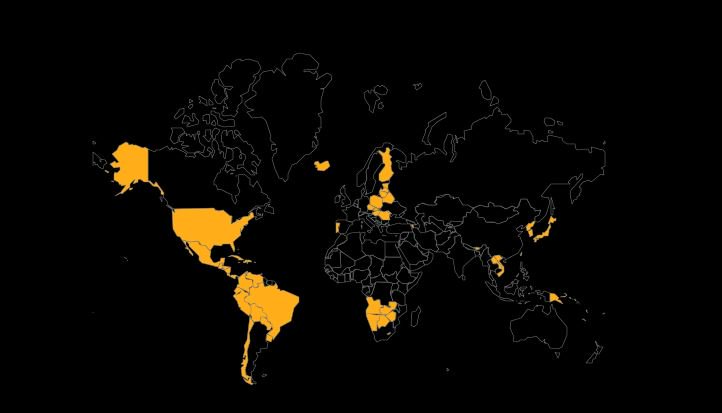Republican debate updates: Fact checking Donald Trump, and how San Bernardino factored in
- Share via
By the numbers
What happened: The fifth and final GOP debate of 2015 continued the trend the campaign has taken in the two weeks since the San Bernardino terror attack: It was dominated almost exclusively by national security discussions, and with candidates trying to find a way to either confront or slip around front-runner Donald Trump.
- Our summary of the main debate .
- Four candidates faced off in the undercard debate and Donald Trump dominated much of the conversation
- FACT CHECK: Trump's claim that 9/11 hijackers sent family and girlfriends home
- FACT CHECK: That $150 billion already belonged to Iran
- FACT CHECK: Are people "pouring" over border like Trump says?
5 takeaways from the Republican debate
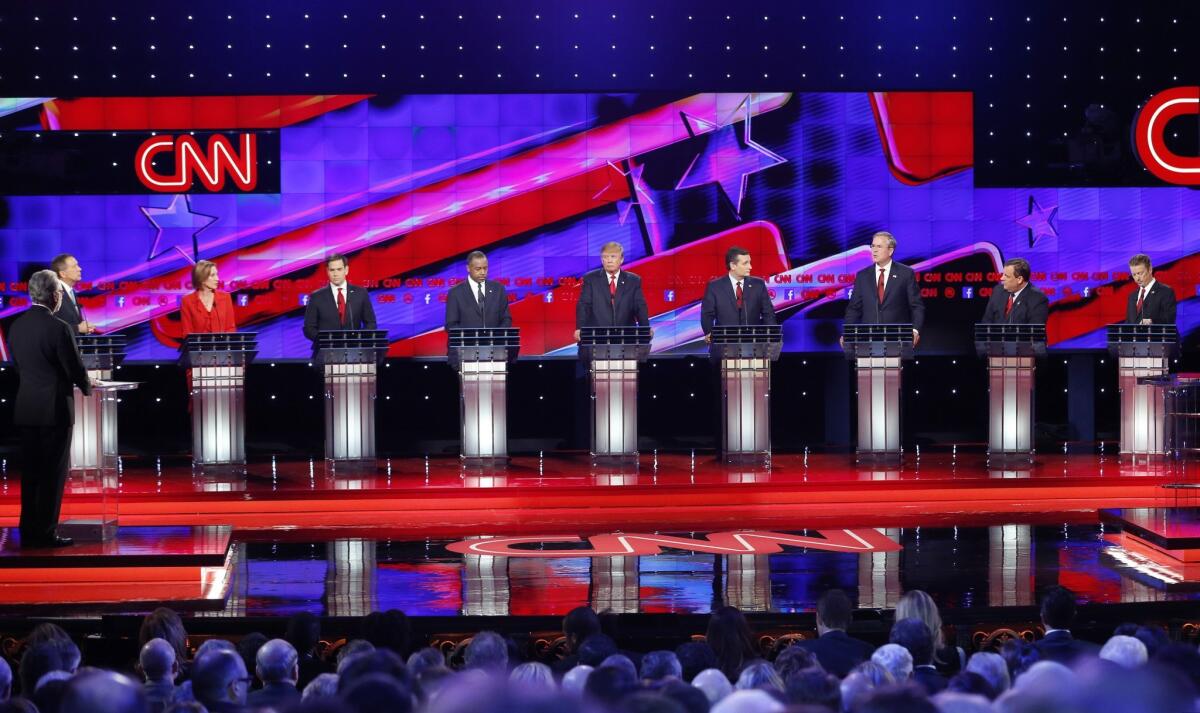
Republican presidential candidates, from left, John Kasich, Carly Fiorina, Marco Rubio, Ben Carson, Donald Trump, Ted Cruz, Jeb Bush, Chris Christie, and Rand Paul respond to debate moderator Wolf Blitzer, far left, during the Republican presidential debate at the Venetian Hotel & Casino in Las Vegas.
The fifth and final GOP debate of 2015 came less than two weeks after the San Bernardino attacks, which thrust the campaign conversation into a new phase, dominated almost exclusively by national security, that continued into Tuesday night. Though the issues were sober, the candidates did not hold back in attacking each other. Here are five takeaways:
1. The enemy: Political correctness
Several Republicans on the debate stage reached agreement on this point, underscored by the failure to detect the radicalization of the San Bernardino killers, which they laid at the hands of what they called a timid Obama administration.
2. Donald Trump has a tough night
He let former Florida Gov. Jeb Bush get under his skin. He stumbled in explaining the details of his proposals. He got booed. He questioned the audience for booing him. He attacked the moderators. He cited his poll numbers defensively.
3. Ted Cruz and Marco Rubio acted like the front-runners
Trump may lead in national polls, but the two first-term senators sparred repeatedly and were treated by other candidates as the leaders.
Twitter, Facebook liked Bush going after Trump
It turns out the most shared moment from the debate on both Twitter and Facebook was this one.
Community engagement editor Colleen Shalby rounded up Jeb Bush's aggression toward the GOP front-runner.
Someone was feeling the Bern
Cruz spoke the most, for the second time in a row
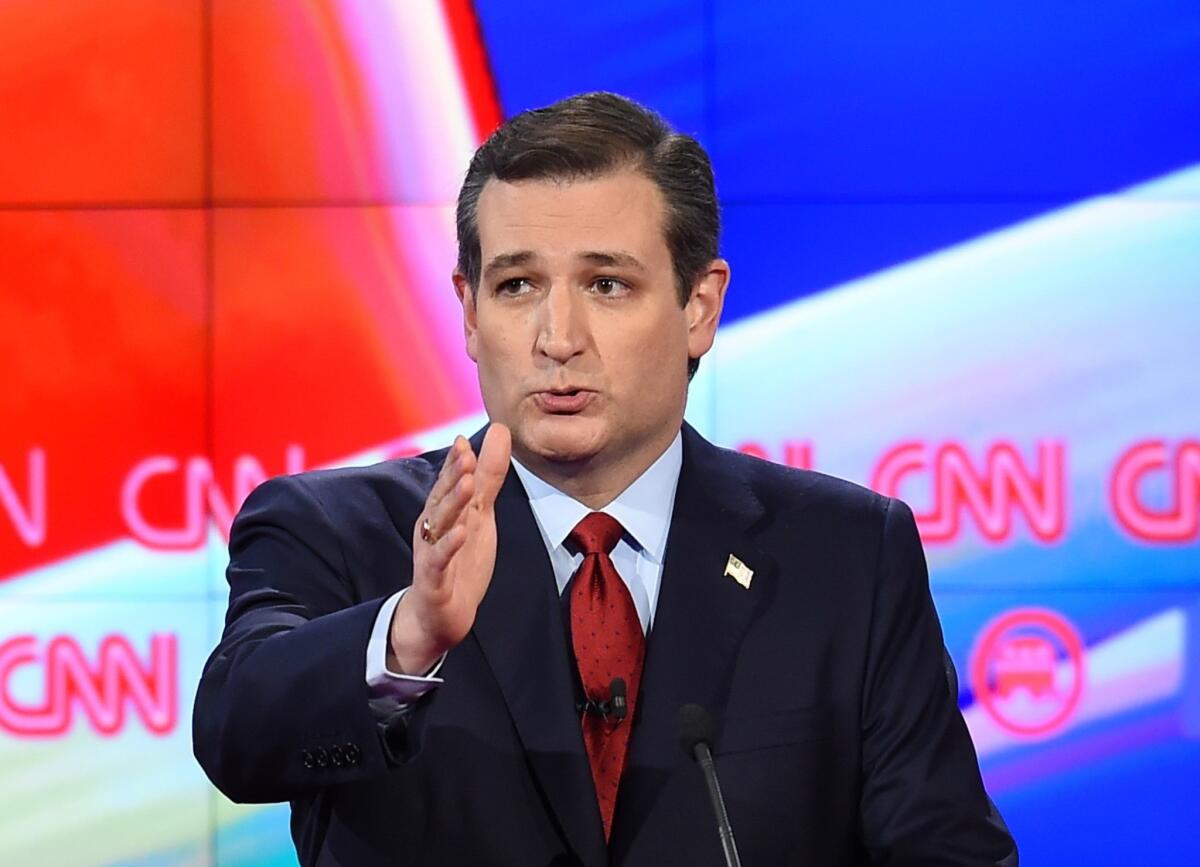
Texas Sen. Ted Cruz gestures during the Republican presidential debate in Las Vegas.
As in last month's GOP debate, Sen. Ted Cruz got in the most speaking time tonight.
With nearly 16 minutes, according to NPR, he came in more than two minutes ahead of the runner-up, Sen. Marco Rubio. Ohio Gov. John Kasich clocked in with the least amount of speaking time.
Here's the full list.
Cruz: 15:58
Rubio: 13:33
Trump: 13:25
Christie: 10:45
Carson: 10:27
Bush: 10:13
Paul: 9:46
Fiorina: 9:32
Kasich: 9:00
Donald Trump dominated the clock in the first two debates. The tide turned in the third debate, held in October: Carly Fiorina held the floor the longest.
Closing words: 'Why should you be president?'
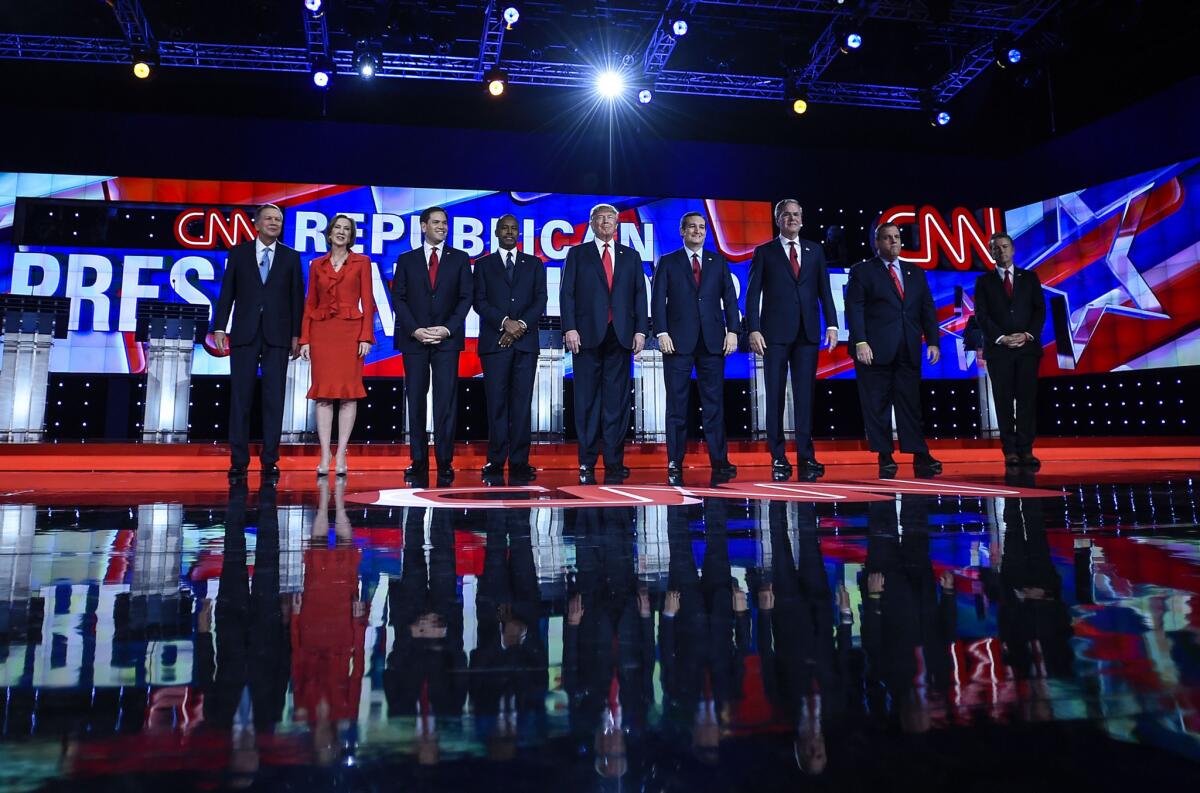
GOP presidential candidates Ohio Gov. John Kasich, Carly Fiorina, Sen. Marco Rubio (R-Fla.), Dr. Ben Carson, Donald Trump, Sen. Ted Cruz (R-Texas), Jeb Bush, New Jersey Gov. Chris Christie and Sen. Rand Paul (R-Ky.) are introduced at the CNN Republican presidential debate at the Venetian in Las Vegas.
Jeb Bush: “For an America to be safe and sound, I ask for your support.” He described himself as the candidate who would “keep you and our country safer stronger and freer."
Dr. Ben Carson: “I’ve been fortunate enough to travel to 58 different countries, and I thank God every day that I was born in this country.… I want to make sure we preserve that exceptionalism for the next generation," he said. "I am not willing to give away American values … for the sake of political correctness.”
Gov. Chris Christie: “Radical jihadist terrorism is not theoretical to me.” As a federal prosecutor after the Sept. 11 attacks, he said, he already has experience protecting against terrorism.
Sen. Ted Cruz: “America can win again, and America will win again.” He cited President Reagan’s economic stewardship and vowed to repeat the performance. “I will do the same thing: cutting taxes, cutting regulation, unleashing small businesses and rebuilding the military to defeat radical Islamic terrorism.”
Carly Fiorina: “To take our country back, to keep our nation safe, we have to begin by defeating Hillary Clinton.... We need to unify our party.” She said she could do that.
Gov. John Kasich: "No Republican has ever been elected president of the United States without winning Ohio." If elected, he said, “we will strengthen and fix America.”
Sen. Rand Paul: “The greatest threat to our national security is our debt. We’re borrowing $1 million a minute, and whose fault is it? Both parties'.” He promised to hold the line on spending, said he’d be the only candidate to mention the debt and said the U.S. would be weaker if it went further into debt.
Sen. Marco Rubio: “Millions of Americans feel like they’re being left behind.... This election is about electing a president who will restore our economic vibrancy.”
Donald Trump: “Nothing works in our country. If I’m elected president, we will win again. We will win a lot, and we will have a great, great country, better than before.”
Trump and Cruz go easy on each other
The fights that were avoided in Tuesday’s debate were just as notable as the blows that were exchanged.
Despite hints of a frayed relationship between Trump and Cruz over the weekend, the two assiduously avoided taking each other on. Trump, when asked about Cruz’s temperament to handle the nuclear codes, back-slapped the Texas senator standing at a neighboring lectern and announced: “He’s just fine. Don’t worry about it.”
Cruz repeatedly sidestepped a chance to take a swipe at Trump’s judgment, saying that’s an assessment voters would have to make for themselves.
Trump also passed up a chance to take on the Republican Party, saying he would not consider an independent bid should he not get the GOP nomination.
“I am totally committed to the Republican Party,” Trump said. "I feel very honored to be the front-runner."
Donald Trump: I'm 'totally committed' to GOP
Donald Trump made news immediately in the first Republican debate in Cleveland by refusing to raise his hand when asked if he'd pledge to support the Republican nominee.
But Tuesday, amid fresh speculation about what might ensue in a possible brokered convention, Trump said in the debate that he was "totally committed to the Republican Party."
"I really am," he said after being asked about a potential third-party run.
After questioning Ted Cruz's temperament days ago, Trump also backtracked on that. "He's just fine," he said when pressed during the debate on his recent comments.
Ben Carson, too, after his own threat to bolt the party, said he was reassured by the Republican National Committee chairman.
To Christie, Jordan's king goes from friend to forgotten
Seeking to demonstrate some fluency on foreign policy, Chris Christie had something of an "oops" moment Tuesday, flubbing the name of a key U.S. ally during the Republican debate.
The New Jersey governor blasted his rivals as "bystanders" in Congress while touting his experience as an executive, saying it would translate better to the role of commander-in-chief.
"You have to be responsible and accountable," he said. "The president needs to be a force that is trusted in the world. ... This president is not trusted."
He cited the Iran nuclear deal as an example of why some regional allies might not trust President Obama.
"I will tell you this, when I stand across from King Hussein of Jordan and I say to him, 'You have a friend again sir, who will stand with you to fight this fight,' he'll change his mind," Christie said.
The current king of Jordan, though, is King Abdullah II, son of the late King Hussein, who died in 1999.
It's an odd gaffe considering that Christie faced criticism this year after the New York Times reported that Abdullah had paid for part of the Christie family's travel in the Middle East after a trade mission to Israel in 2012.
"King Abdullah invited the governor and his family to Jordan as his personal guest so the two families could spend time together," Christie's spokesman said at the time, saying the two were friends.
Climate change ad airs during debate
We have reported about Steyer's debate push in our daily Essential Politics newsletter. Are you a subscriber ?
Breaking down Rubio's role in the Senate fight over immigration
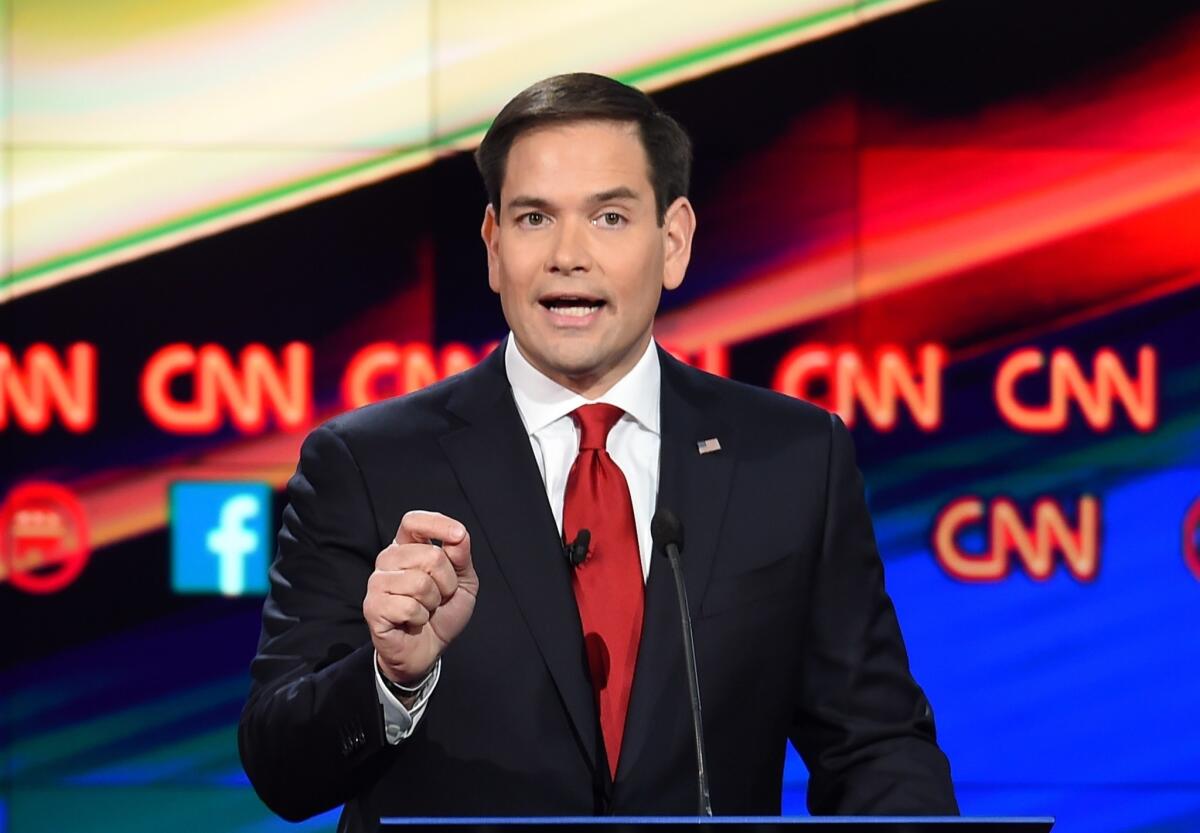
Republican presidential candidate Florida Sen. Marco Rubio gestures during the Republican Presidential Debate in Las Vegas, Nevada.
Marco Rubio and Ted Cruz ripped open an old wound Tuesday night -- their fight over the immigration reform bill that died in Congress. Rubio helped negotiate the overhaul, a workaround to a path to citizenship for people in the U.S. illegally, before abandoning when it became clear the proposal would go nowhere. The Times' Lisa Mascaro recently explored what that process revealed about Rubio's political and negotiating skills.
To intervene or not to intervene?
Asked if it's better to leave Middle East dictators in power or intervene to oust them, Donald Trump lamented the vast resources the U.S. has put toward interventions in the region. He said the trillions of dollars would have been better spent at home improving the country’s infrastructure.
"It’s not like we have victory,” Trump said. “It's a mess. The Middle East is totally destabilized.”
Trump's pronouncement that he’d rather spend the money domestically prompted an incredulous response from Carly Fiorina, who said the businessman echoed President Obama.
“I’m amazed to hear that from a Republican presidential candidate,” she said.
Ben Carson also appeared disinclined to back an aggressive foreign policy, saying that the country should act like a passenger on an airplane when oxygen masks are deployed: Take care of oneself before tending to others.
"We need to start thinking about the needs of American people before we go and try to solve everybody else’s problems,” Carson said.
But Jeb Bush, whose brother, former President George W. Bush, ordered the invasion of the Iraq, stood by his position that deposing Saddam Hussein was a good idea.
“The lessons learned are we have to have a strategy to get in and a strategy to get out,” Bush said.
Rubio and Cruz battle over battle against Islamic State
For several weeks Sens. Marco Rubio of Florida and Ted Cruz of Texas have battled on the campaign trail, and Tuesday night their rivalry was on full display as the pair tussled over how to defeat Islamic State terrorists overseas.
Rubio has consistently labeled Cruz as an “isolationist” and highlighted his three votes in recent years against the Defense Authorization Act, saying that the Texas senator’s pledges to defeat Islamic State are not in line with his voting record.
“He’s voted against a bill that funds the troops,” Rubio said. “I have to assume that if you vote against it in the Senate you will also veto it as president.”
As Cruz, who does not support placing troops on the ground to defeat Islamic State, called for an intensified air assault to defeat terrorist cells in cities in Iraq and Syria, Rubio on several occasions Tuesday highlighted his voting record.
“Airstrikes are important, but we need to have an Air Force capable of doing it,” said Rubio, saying that Cruz’s votes had weakened the U.S. military’s efforts abroad. “We can’t bomb ISIS if we don’t have planes and bombs to attack them.”
Cruz dismissed Rubio’s criticism, saying he would ensure the U.S. military is strong and capable of fighting terrorists abroad.
“You know, Marco has continued these attacks, and he knows they're not true. Yes, it is true that I voted against the National Defense Authorization Act, because when I campaigned in Texas I told voters in Texas that I would oppose the federal government having the authority to detain U.S. citizens permanently with no due process,” he said.
Cruz added, “ISIS and radical Islamic terrorism will face no more determined foe that I will be.”
On the campaign trail, Cruz has looked to highlight Rubio’s voting record as well.
He’s called Rubio weak on immigration, noting his support of a bipartisan Senate bill in 2013 that would have provided a path to citizenship for an estimated 11 million people in the country illegally.
Christie ready to shoot down Russian planes

As Syria enters the fifth year of a civil war that has displaced millions of people, many Republican presidential hopefuls are pushing for the United States to implement a no-fly zone over the country.
Former Florida Gov. Jeb Bush, along with Sen. Marco Rubio of Florida, New Jersey Gov. Chris Christie, Ben Carson and Carly Fiorina all support a no-fly zone. They argue that it would prevent civilian casualties and be a show of force toward Russian President Vladimir Putin, whose military has carried out airstrikes on behalf of Syrian President Bashar Assad.
Christie said on Tuesday night that he’d be prepared to shoot down Russian planes.
“Not only would I be prepared to do it, I would do it," he said.
Sen. Rand Paul of Kentucky, whose libertarian leanings have done little to help him gain traction in the GOP primary, does not support a no-fly zone.
Criticizing Christie, he said, "If you're in favor of World War III, you have your candidate."
Paul is joined by Texas Sen. Ted Cruz in his opposition. Billionaire businessman Donald Trump, the front-runner for the party’s nomination, has not voiced a definitive position on the issue.
Paul, Cruz and Fiorina oppose an expanded troop presence. Rubio, Trump, Bush and Carson have said boots on the ground are needed to defeat Islamic State, which inspired the terrorist attacks in Paris and San Bernardino.
President Obama has resisted deeper U.S. engagement in the region, saying that he doesn’t want to get the U.S. involved in another protracted conflict like the Iraq war and calling on regional allies to join the fight against Islamic State.
Fact check: Trump's claim that 9/11 hijackers sent family and girlfriends home unfounded
As Donald Trump defended his plan to target the family members of Islamic State extremists, he claimed that the 9/11 hijackers sent family members and girlfriends to Saudi Arabia before the attacks.
But only two of the hijackers were married, and there was no evidence that their wives ever entered the United States, according to the 9/11 Commission report.
One of the terrorists had a German girlfriend, but there was no evidence that she knew of the plot, and she last visited the United States in early 2001, according to her testimony at a trial for a 9/11 accomplice.
Trump made a similar claim earlier this month, which was thoroughly debunked by the Washington Post and earned four Pinocchios on the paper’s fact-checking scale.
A clash over monitoring our data
The debate over how to strike the balance between stopping would-be terrorists and protecting Americans’ privacy yielded one of the first combative exchange among the GOP contenders Tuesday night.
At issue was Sen. Ted Cruz’s support for legislation this year that changed how law enforcement could conduct surveillance and gather data, including ending the bulk collection of metadata from phone calls.
Cruz said the bill “strengthened tools of national security,” but Sen. Marco Rubio, echoing critiques he has been lobbing at his Senate colleague on the campaign trail, said Cruz’s vote for the law made Americans less safe.
“This is not just the most capable, it is the most sophisticated terror threat we’ve ever faced,” Rubio said. “We are now at a time when we need more tools, not less tools. And that tool we lost — the metadata program — was a valuable tool we no longer have at our disposal.”
Coming to Cruz’s defense was Sen. Rand Paul of Kentucky, a libertarian who opposes broad surveillance, arguing the bulk collection of data overwhelms law enforcement and makes us “less safe."
Paul also slammed Rubio for trying to "have it both ways,” criticizing the Florida senator for his work on comprehensive immigration reform.
“He’s the weakest of all the candidates on immigration,” Paul said, adding Cruz has “more allegiance to [New York Democratic Sen.] Chuck Schumer and the liberals than he does to conservative policy.” That jab brought an approving roar from the debate audience.
Also jumping into the fray was New Jersey Gov. Chris Christie. Quick to plug his national security bona fides as a former federal prosecutor, he accused Paul, Cruz and Rubio of being preoccupied with “endless debates about how many angels on the head of a pin from people who have never had to make a consequential decision in an executive decision.”
Fact check: That $150 billion already belonged to Iran
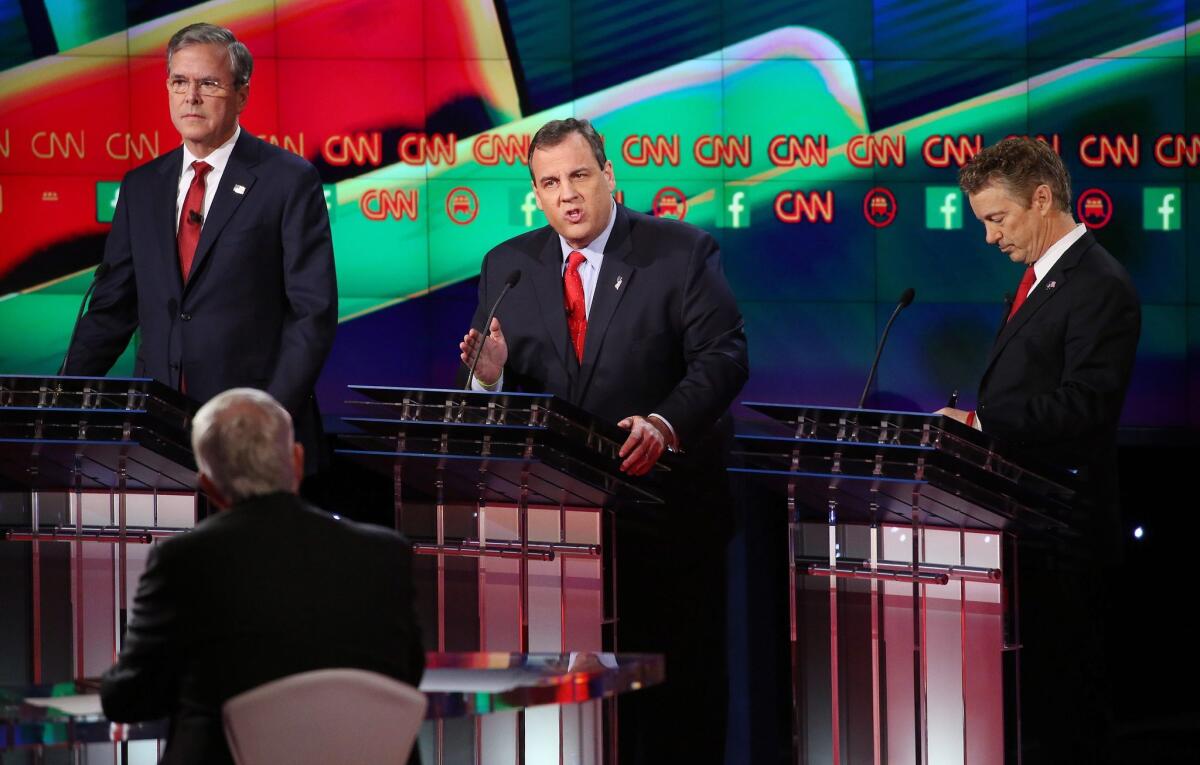
(left to right) Former Florida Governor Jeb Bush, New Jersey Governor Chris Christie and Kentucky Senator Rand Paul during the Republican Presidential candidate debates in Las Vegas
Several candidates, including Donald Trump and New Jersey Gov. Chris Christie, complained Tuesday that President Obama's landmark nuclear deal includes "giving" Iran $150 billion.
Trump said he "certainly would never have made that horrible, disgusting, absolutely incompetent deal with Iran where they get $150 billion."
The deal, which prevents Iran from obtaining a nuclear bomb for more than a decade, simply unfreezes $100 billion-$150 billion in Iranian assets that had been sitting in international accounts, inaccessible to Tehran. Renewed access to that money was a key part of why Iran agreed to limit its nuclear program.
Jeb on a mission: Leap on the Trump grenade
Jeb Bush appears to have come into Tuesday's debate with a clear purpose in mind: leap on the Trump grenade for the good of the party.
In a key debate-within-the-debate for the party, Bush has twice aggressively gone after the GOP front-runner as a dangerous candidate.
"He's a chaos candidate. And he'd be a chaos president," he said of the proposed Muslim immigration ban, as Trump scowled early on in the debate.
And later: "Donald, you're not going to be able to insult your way to the presidency. That's not going to happen." The audience in Las Vegas roared with approval.
Bush's camp could not have known that the former Florida governor would be perhaps the lone aggressor. But it was happy to highlight it once that became clear.
For his part, Trump was content to return to his "low energy" jabs. "With Jeb's attitude, we will never be great again," he said.
How Silicon Valley really feels about technology used for surveillance
Republicans on the stage Tuesday called for stronger partnerships between the government and Silicon Valley in response to questions about the privacy-vs.-security debate that has emerged anew in the wake of the Paris and San Bernardino attacks, where the perpetrators used electronic communications to plan their attacks.
"Our government has become incompetent, unresponsive, corrupt," former Hewlett-Packard CEO Carly Fiorina said in describing investigators' perceived shortcoming in uncovering the plots ahead of time. "[Such a] lack of accountability is now dangerous."
She suggested that bringing the expertise of tech firms to Washington could help improve U.S. security.
Ted Cruz cited the San Bernardino attacks, the Boston Marathon bombing in 2013 and the Fort Hood massacre in 2009 in calling for closer monitoring of terrorists' communications.
But where is Silicon Valley on all this?
Tech leaders see the government as forcing their hand and grumble that it hurts their bottom line. The National Security Agency surveillance revealed by ex-contractor Edward Snowden is "making it very difficult for American firms to do business," Google Chairman Eric Schmitt said last year.
Tech firms' cooperation is also one area where the Republicans form a surprising alliance of sorts with Democratic front-runner Hillary Clinton, who has repeatedly called for digital companies to do more to fight Islamic State online.
Jeb Bush pushes back against Trump's rhetoric on Muslims
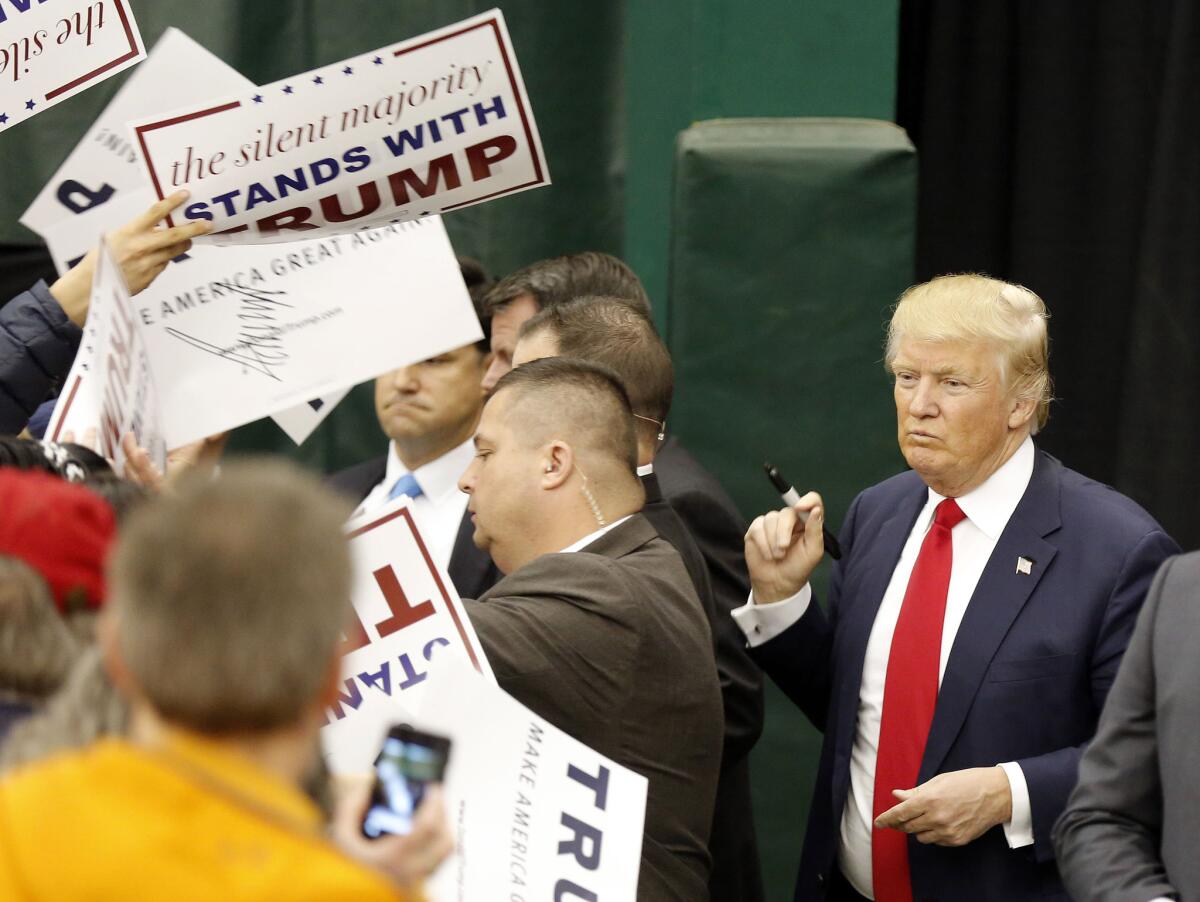
Supporters meet Republican presidential front-runner Donald Trump on Tuesday in Waterville Valley, N.H. His supporters appear solidly behind him despite criticisms.
After the Sept. 11 attacks, President George W. Bush went to a mosque to say "Islam is peace." His brother, presidential candidate Jeb Bush, said during Tuesday's debate that those words still have meaning at a time when Americans are concerned about terrorism threats from the Islamic State.
"We can’t disassociate ourselves from peace-loving Muslims," he said.
The conversation has been sparked by Donald Trump’s call for barring Muslims from entering the U.S., which drew widespread condemnation and marked an escalation in what was already a campaign season characterized by controversy over candidates’ views on religion and national security.
Florida Gov. Jeb Bush has suggested screening for religion as the U.S. decides which Syrian refugees to allow into the country. The vast majority of those fleeing the war in Syria are Muslim, but Bush said the Obama administration should focus on accepting those who are Christian.
“You can prove you’re a Christian,” Bush has said. Asked how visitors’ Christian faith could be proved, Bush, who like most of his GOP rivals is trying to gain support among evangelicals, told reporters, “I think you can prove it.”
Sen. Ted Cruz of Texas has also endorsed a religious test for accepting refugees, saying there was no “meaningful risk” of terrorist attacks by Christians.
“If there were a group of radical Christians pledging to murder anyone who had a different religious view than they, we would have a different national security situation," Cruz told reporters recently in South Carolina.
When Trump released his proposal last week, Cruz did not criticize it, saying instead, “That is not my policy.”
Ben Carson, the retired pediatric neurosurgeon, has said he does not believe a Muslim should be president. After that statement was condemned, Carson suggested it would be OK to have a Muslim president if he or she renounced Sharia law.
Carson has also compared the Syrian refugees to dogs. “If there is a rabid dog running around your neighborhood, you’re probably not going to assume something good about that dog,” he said. “And you’re probably going to put your children out of the way.”
But Carson took exception to Trump’s proposal, saying there should not be a religious test to enter the country.
New Jersey Gov. Chris Christie said recently that the Syrian refugees pose such a high security risk to America that even orphans under 5 years old should be denied entry. But he criticized Trump’s proposal, saying it showed why he was unfit to lead the nation.
Sen. Rand Paul of Kentucky has proposed a ban on immigration from 33 countries that he identifies as a terrorism threat; nearly all of them are mainly Muslim. But he opposed Trump’s plan to make religion the deciding factor on letting people into the country.
What Rubio's work on immigration legislation revealed
During the battle over the 2013 immigration overhaul bill, The Times' Lisa Mascaro wrote, Rubio showed keen political instincts and a quick grasp of tricky policy issues. Fellow senators saw him as a hard worker, willing to roll up his sleeves to hammer out a deal, even canceling a flight home one weekend as negotiations dragged all night.
But as shown in the problematic citizenship workaround that was created for him, Rubio also became known as a relatively inexperienced lawmaker whose short-term political calculations sometimes worked against his long-term goals.
U.S. already has one of the world's smallest Muslim populations
Ben Carson is discussing Muslims in America.
In this map, countries shown in orange are those in which Muslims made up less than 1% of the population as of 2010.
Fact check: Trump says people are 'pouring' over the border, but immigration is down dramatically
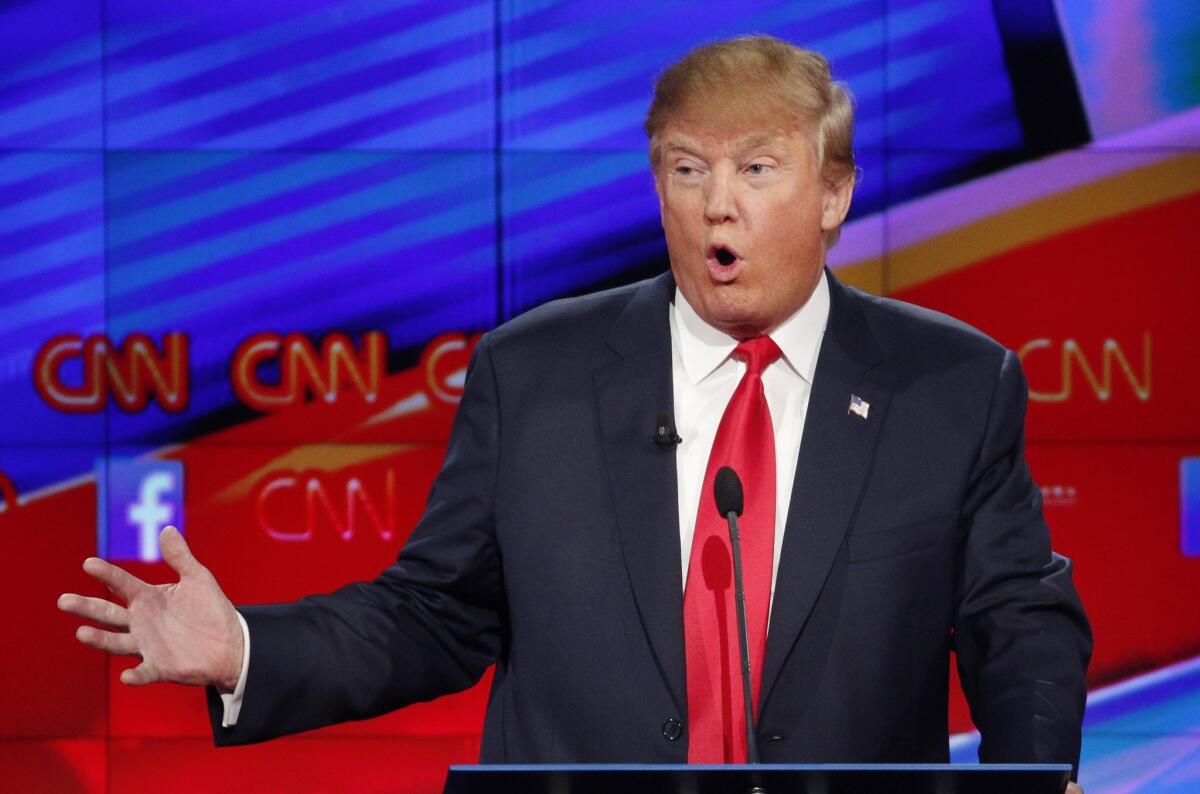
Donald Trump makes a point during the CNN Republican presidential debate at the Venetian Hotel & Casino in Las Vegas.
In the first minutes of the GOP presidential debate on Tuesday, front-runner Donald Trump defended his plans to temporarily ban non-American Muslims from entering the U.S., to deport people who are in the country illegally and to build a massive wall on the southern border to stop further illegal immigration.
In defending his plan, Trump claimed, “People are pouring across our southern border.”
But according to a November report on illegal immigration by the Pew Research Center, the flow of Mexican immigrants into the United States has dropped dramatically and is at the lowest level since the 1990s.
“The decline in the flow of Mexican immigrants to the U.S. is due to several reasons,” the report says. “The slow recovery of the U.S. economy after the Great Recession may have made the U.S. less attractive to potential Mexican migrants and may have pushed out some Mexican immigrants as the U.S. job market deteriorated.”
The report also credited stricter enforcement of immigration laws along the border for easing the flow of immigrants. Border apprehensions fell recently to a level not seen since 1971, Pew noted. And of those who made it into the U.S., the number of deportations has increased over the past decade.
Fact check on Fiorina: Twitter is older than you think
Former Hewlett-Packard Chief Executive Carly Fiorina was attempting to make a point about how technology has rapidly changed.
But she erred when saying Snapchat and Twitter had been around "just for several years."
But the first tweet was sent when Twitter officially started on March 21, 2006 — nearly a decade ago and when George W. Bush was still president.
The first iteration of Snapchat opened up shop in summer 2011, and it had 100,000 users one month before Mitt Romney became the GOP nominee in 2012.
Judging by her expression and a pause as she spoke, Fiorina may have realized her mistake.
Kasich says fighting Islamic State should have overridden climate talks
That summit ended with a climate agreement among nearly 200 countries.
Here's why Obama skips the term 'radical Islamic terrorism'
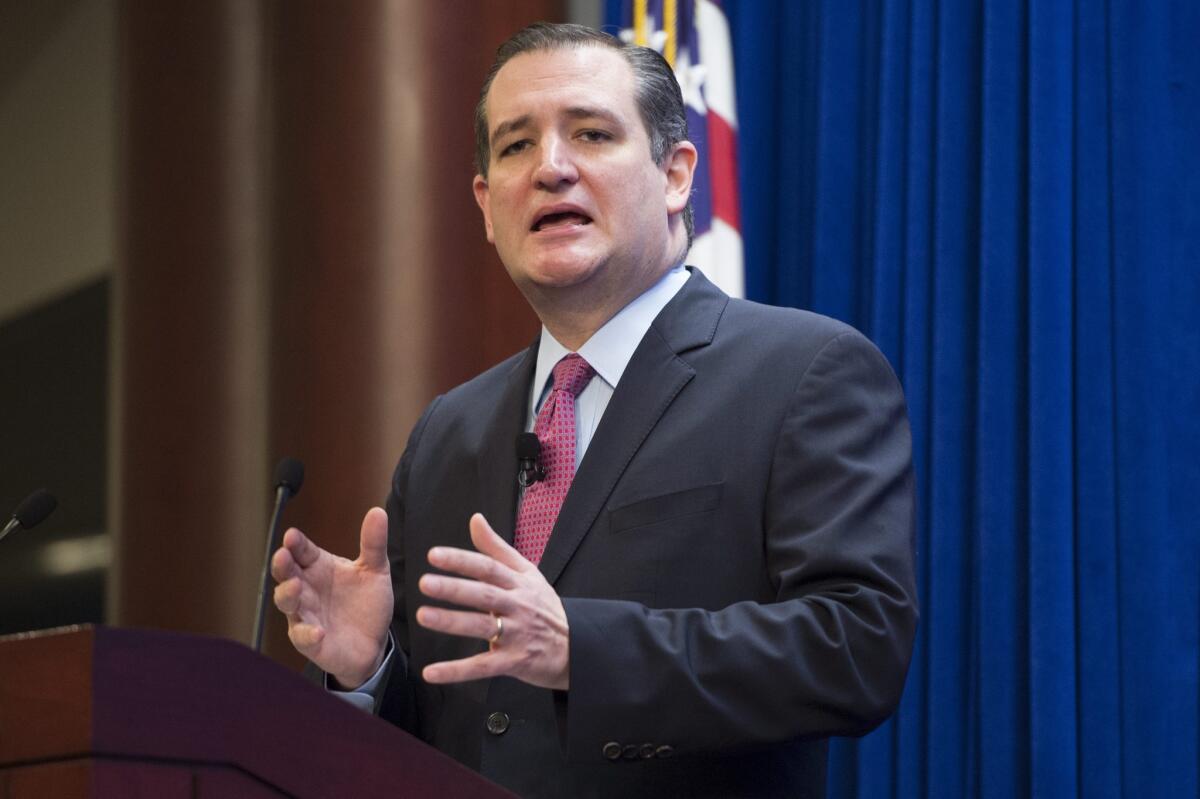
Republican presidential candidate Ted Cruz delivers an address on protecting the nation from terrorism and his vision for foreign policy at the Heritage Foundation in Washington, D.C. on Dec. 10.
Ted Cruz was the first candidate Tuesday night to go after President Obama and Hillary Clinton, Obama's former top diplomat, for avoiding the term "radical Islamic terrorism" and similar phrases.
"We should focus on the problem and defeat radical Islamic terrorism," Cruz said, echoing a frequent Republican line of attack.
So, why, exactly, does Obama skip the phrase? For one, to keep from alienating the world's billion or so Muslims, among them leaders of some critical allies in the fractious Middle East as well as Americans.
Earlier this year, The Times explored the Obama administration's argument:
Bush has a zinger for Trump, but . . .
. . . there weren't a lot of people to see it at his debate-watching party in Miami.
How Trump’s proposed ban on Muslims would work (or not)
Right out of the gate, the Republican presidential candidates are talking about Donald Trump's proposal last week to ban Muslims from entering the United States.
The proposal has been the subject of intense scrutiny and criticism, mostly for its extreme nature. But there’s a second question: Is it even possible?
Trump’s own plan for banning Muslims is hardly a plan.
Trump has said that such a ban should not last for long, but he would not define how he would determine when it would be safe enough to lift the ban. “All it can be is a feel or a touch,” he said on MSNBC last week. “We have to find it out.”
And how would border officials enforce it? “They would say, ‘Are you Muslim?’” Trump said.
He has not said how he would determine whether people were lying. And he has carved out a few exceptions, including for sports figures.
Scholars are divided over the proposal’s legality.
Immigration law does not give those entering the country the same constitutional protections given to Americans, The Times’ David Savage reported this week.
“If you take seriously the cases that have been decided in the past, they would find it constitutional,” said University of Chicago law professor Eric Posner. “If someone can be excluded from this country merely for having the wrong political beliefs, he could be excluded for having the wrong religious beliefs.”
But Posner and others said such a question would ultimately be settled by the courts, which could view exclusion based on religion in a different light.
“If a restriction on Muslims were to become law, it would not surprise me to see the courts strike it down as irrational -- and probably because it sweeps too broadly,” said UCLA law professor Hiroshi Motomura, who teaches immigration law.
Trump on Trump
Carson asks for moment of silence for San Bernardino victims
Retired neurosurgeon Ben Carson used his opening statement to call for a moment of silence in honor of the 14 people killed in San Bernardino on Dec. 2.
As Sarah Wire reported just after the attacks, Rep. Jackie Speier (D-Hillborough) has said she will no longer stand when that happens.
“I’m not going to stand up for a moment of silence again and then watch us do nothing," Speier told Wire. She is calling for stricter gun control measures.
She said moments of silence are "hypocritical" because Congress has not addressed gun violence.
“I’ve had it. I have had it with inaction. I’ve had it with the sense that it’s OK that we not act,” Speier said.
On the House floor tomorrow, Rep. Pete Aguilar (D-Redlands) plans to lead a moment of silence for the victims of the massacre in his district.
Inside Marco Rubio's childhood in Las Vegas
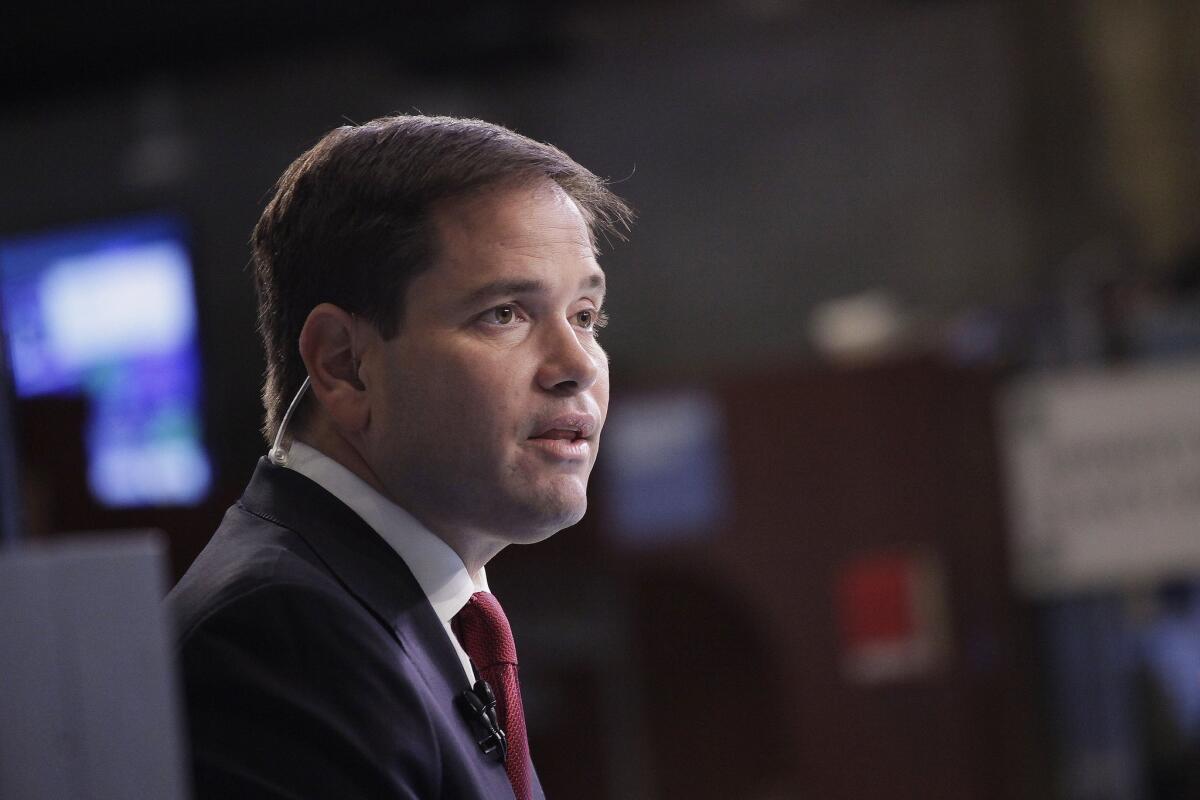
In his opening statement, Marco Rubio mentioned the six years of his childhood he spent in Las Vegas, the host city of tonight’s debate. Go in depth with The Times’ Lisa Mascaro on Rubio’s years there, when he was known as Tony and marched in union lines with his father.
Looks like they expected more journalists
In the spotlight: San Bernardino
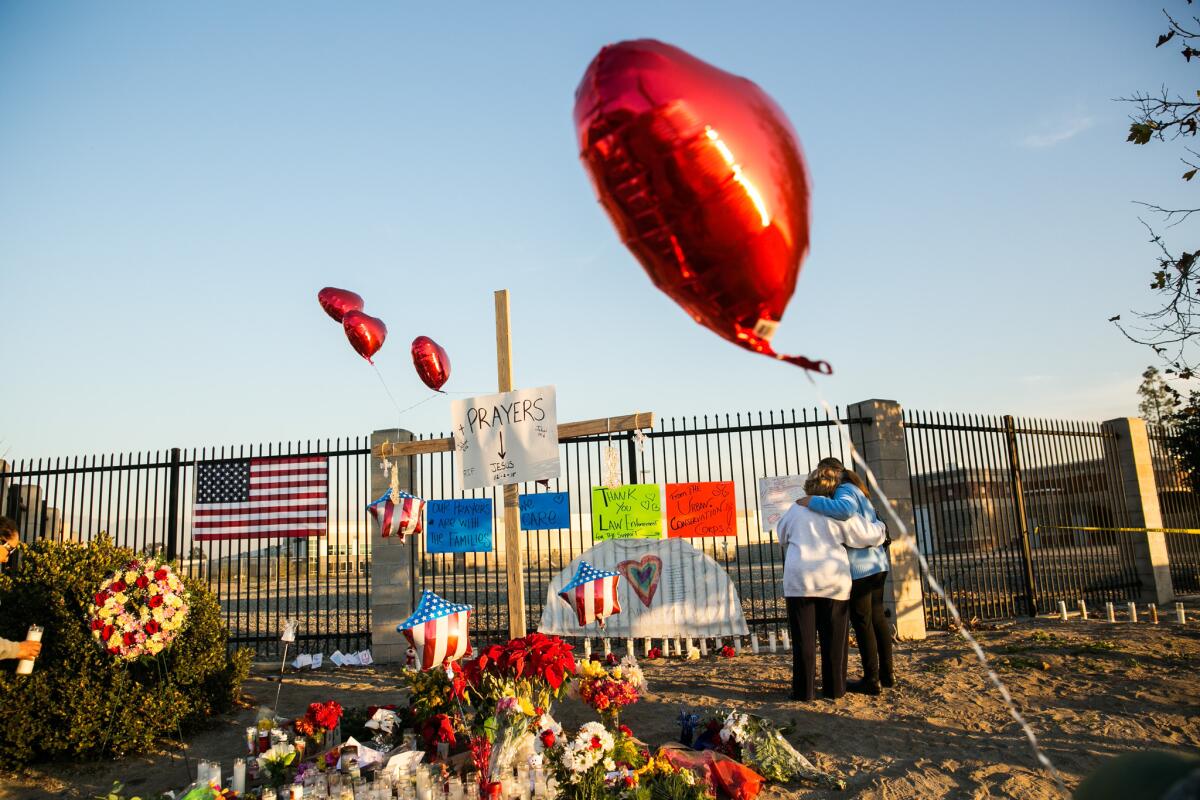
Two people quietly pay their respects Friday at the makeshift memorial erected for victims of Wednesday’s shootings at the Inland Regional Center in San Bernardino.
The recent attack in San Bernardino has focused attention on the dangers of terrorism, and it's bound to be a big topic of discussion on Tuesday night at the Republican presidential debate.
The Times has been reporting extensively on the attack, and you can read the coverage here.
To sum it up
Three takeaways from the undercard debate
The first round of the GOP candidate debate, featuring the four also-ran candidates, was dominated by foreign policy and the war on terror, with the terms of the discussion largely set by the front runner, Donald Trump.
Trump, of course, was not present, because this was the debate for the candidates who didn't make the main stage. Indeed, this may have been the last chance to see some of these four candidates, who are so low in the polls that they may not get another invitation.
But the debate was nonetheless substantive and spirited. Here are a few takeways:
Graham apologizes to Muslim allies
Republicans have long criticized President Obama for what they have characterized as a series of apologies to foreign leaders. But on Tuesday night, Sen. Lindsey Graham of South Carolina found himself apologizing on behalf of America for Trump, who has called for a near-blanket ban on Muslims entering the country.
“To the president of Egypt, I am sorry,” Graham said. “He does not represent us.”
Graham later mentioned another ally to make his larger point, that the United States needs moderate allies in the region to avoid the pitfall of declaring war on an entire religion.
“Muslims have died by the thousands,” Graham said. “How do you think the king of Jordan must feel to hear that," he said, referring to Trump's proposal.
"Stop this before it's too late.”
Some struggling candidates still trying to catch some Trump glow
None of the four candidates endorsed Trump’s call to stop Muslims at the border, but former Pennsylvania Sen. Rick Santorum said “he brings up a legitimate issue.”
And former Arkansas Gov. Mike Huckabee said “he has touched a nerve because people are angry and afraid.”
Even former New York Gov. George Pataki, a fierce Trump critic, put some of the blame for the popularity of Trump’s proposal on Obama and Hillary Clinton, the likely Democratic nominee.
Pataki said their reluctance to define the enemy as "radical Islamic terrorism" has caused many Americans to lump the entire religion together.
San Bernardino has intensified the level of fear
The election was already dominated by fear, but recent events have heightened the concern.
Pataki opened the debate by involving the school closure in Los Angeles Tuesday to note that “we are in crisis.”
Santorum said, “WWIII has begun.”
Huckabee said Americans are “just plain scared.”
Graham: “The next 9/11 is coming from Syria. It’s coming soon.”
Trump dominates undercard debate even though he's not there
Donald Trump wasn't on stage in the first round of the GOP debate Tuesday evening, but he dominated the early conversation nonetheless.
The first questions to the four also-ran candidates from the moderator, CNN's Wolf Blitzer, asked their opinions about Trump's proposal to ban most Muslims from the U.S. Three of the four said they disagreed.
Sen. Lindsey Graham of South Carolina was the most outspoken, saying that Trump's idea was a "coup" for Islamic State and "a way to help our enemies.”
The U.S. can win the fight against Islamic State, also known as ISIS or ISIL, only by uniting with Muslims who oppose radical jihad, and Trump's words were alienating them, he said.
But Graham said that he would still back Trump if he became the Republican nominee, although he added that he "might sleep late" on election day.
Former New York Gov. George E. Pataki and former Arkansas Gov. Mike Huckabee also criticized Trump.
Former Sen. Rick Santorum of Pennsylvania said that Trump's idea might not be the best, but that he was making a valid point.
"Not all Muslims are jihadists," he said. "But the reality is, all jihadists are Muslims."
Trump to appear on 'Jimmy Kimmel' on Wednesday
Donald Trump will head to Los Angeles on Wednesday to appear on "Jimmy Kimmel Live" two months after canceling an appearance on the ABC late-night show.
Kimmel tore into Trump after he bailed at the last minute in October.
“Why did he cancel? We told him there were cameras here, right?” Kimmel said at the time. “Don’t worry, tonight we’re gonna give everyone in the audience a basketball dipped in cologne so you can fully experience what it would have been like had Donald Trump been here.”
Want a sense of the questions Kimmel might ask? Read my story from last month when Hillary Clinton came by the show.
Trump will be in Mesa, Ariz., for a rally Wednesday morning.
U.S. split sharply over whether Islam fosters violence

As Republicans prepare for a debate likely to be dominated by talk of Islam and terrorism, new polls show Americans divided on the question of whether the religion is violent by nature.
Republicans are far more suspicious than other Americans of an inherent link between Islam and violence, the polls show, a fact that is likely to strongly influence the GOP presidential hopefuls as they debate.
A survey by the nonpartisan Pew Research Center, released Tuesday, found that a large majority of white evangelical Protestants, a key Republican constituency -- as well as smaller majorities of older Americans and those with less education -- said Islam is more likely than other religions to encourage violence among its believers.
Overall, Americans split evenly on the question of whether Islam is more likely to encourage violence than other religions, with 46% saying it is more likely to do so and 45% saying it was not, the Pew poll found. That close division has been constant for most of the last decade in Pew polls.
But the partisan divide on the issue has grown since the George W. Bush years, when followers of the two parties largely agreed on the issue.
Paul lashes out at Rubio before debate
Hours before Tuesday’s GOP presidential debate, Sen. Rand Paul of Kentucky repeatedly lashed out at Florida Sen. Marco Rubio as insufficiently conservative.
Paul, who barely made the prime-time debate because of his poor standing in the polls, repeatedly cited Rubio’s support for increased military spending as he chided “an unholy alliance between the right and the left” that was intent on driving up the nation’s debt.
“Marco Rubio wants $1 trillion in more spending for the military. The left wants $1 trillion for domestic welfare, domestic programs,” Paul told a packed rally at his office-park headquarters.
“I don’t think you can be a fiscal conservative if you’re liberal with military spending,” Paul told reporters afterword.
Paul also poked at Rubio’s attendance record in the Senate, which has dropped sharply as he campaigns for the White House. As he argued that the government is still collecting too much of American’s private records, Paul said, “Marco, if you were there to do your job, you would know that.”
Paul enters tonight’s debate needing a breakthrough moment to turn around his floundering campaign. Speaking with reporters, he indicated that surging Texas Sen. Ted Cruz and front-runner Donald Trump also may be among his targets.
Though he and Cruz have previously been tea-party allies, Paul said a key difference between them is that Cruz voted for a Rubio proposal that would have increased military spending by $200 billion without the funding being offset by cuts elsewhere. Cruz also supported reauthorization of the Patriot Act, while Paul did not.
Paul said he was hopeful that Trump would sink in the polls as Ben Carson has, and called the businessman/reality television star a “disaster for our country” who would lead to a historic loss for the GOP if he is the party’s standard-bearer.
“Bombast, stupid comments, idiotic comments are not enough to win an election,” Paul said.
Carly Fiorina weighs in on the cats-versus-dogs question
Even embracing man’s best friend can have its political risks, as Carly Fiorina may find after cutting this video from the new Independent Journal. She could alienate a few cat lovers with her assertion that dogs are just flat-out better.
Then again, few in her target audience are likely to take offense at her crack about Obama, who, as a child in Indonesia, had some experience with eating dog meat.
Besides, Obama himself has made light of that – proving that you can get away with some edgy jokes when you’re top dog.
White House press secretary on Donald Trump's latest rise in the polls
Obama critique of GOP immigration rhetoric: We don't 'remember where we came from'
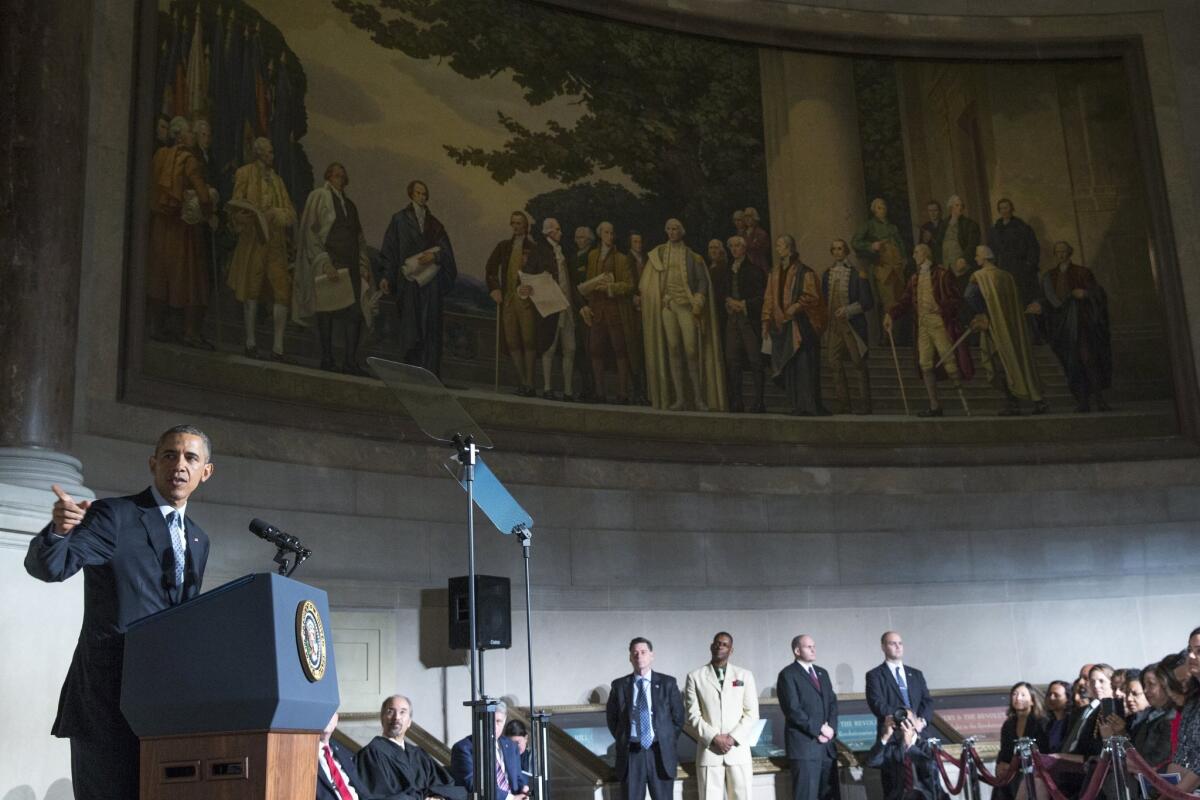
President Barack Obama speaks during a naturalization ceremony at the National Archives in Washington, Tuesday, Dec. 15, 2015. The president described immigration as the nation’s oldest tradition and part of what makes the country exceptional, as he sought to draw a contrast between those who want to seal the borders and those seeking to escape hardships and persecution. (AP Photo/Evan Vucci)
In a bit of Democratic counterprogramming to tonight’s Republican presidential debate, President Obama stood before the U.S. Constitution and called on Americans to “remember where we came from” as a country of immigrants.
Speaking at a naturalization ceremony for new citizens at the National Archives, Obama delivered a sermon explicitly about “welcoming the stranger” – and implicitly about immigration policies being floated in the current presidential campaign.
“How quickly we forget,” Obama said in the darkened rotunda where the American charter documents are displayed. “We suggest that there an ‘us’ and there is a ‘them.’
“On days like today,” he said, “we need to resolve never to repeat mistakes like that again.”
The remarks weren’t that different from those the Democratic president has delivered at naturalization ceremonies of the past.
But at this point in the current presidential debate – on the heels of pronouncements from some Republicans about barring Muslims and Syrian immigrants – it served as a partisan critique.
One of those sworn in as a new American citizen was Lorella Praeili, a Peruvian immigrant who serves as a key advisor to Hillary Clinton’s presidential campaign.
She was one of 31 people from 25 different countries who raised their right hand and swore allegiance to the U.S.
Obama compared all Americans, including the newly minted citizens, to the immigrants and refugees of decades past.
“In the Syrian seeking refuge today,” Obama said, “we should see the Jewish refugee of World War II.”
“The tension throughout our history between welcoming or rejecting the stranger, it’s about more than just immigration,” he said. “It’s about the meaning of America.”
McLaughlin: Understand Donald Trump by looking to Europe
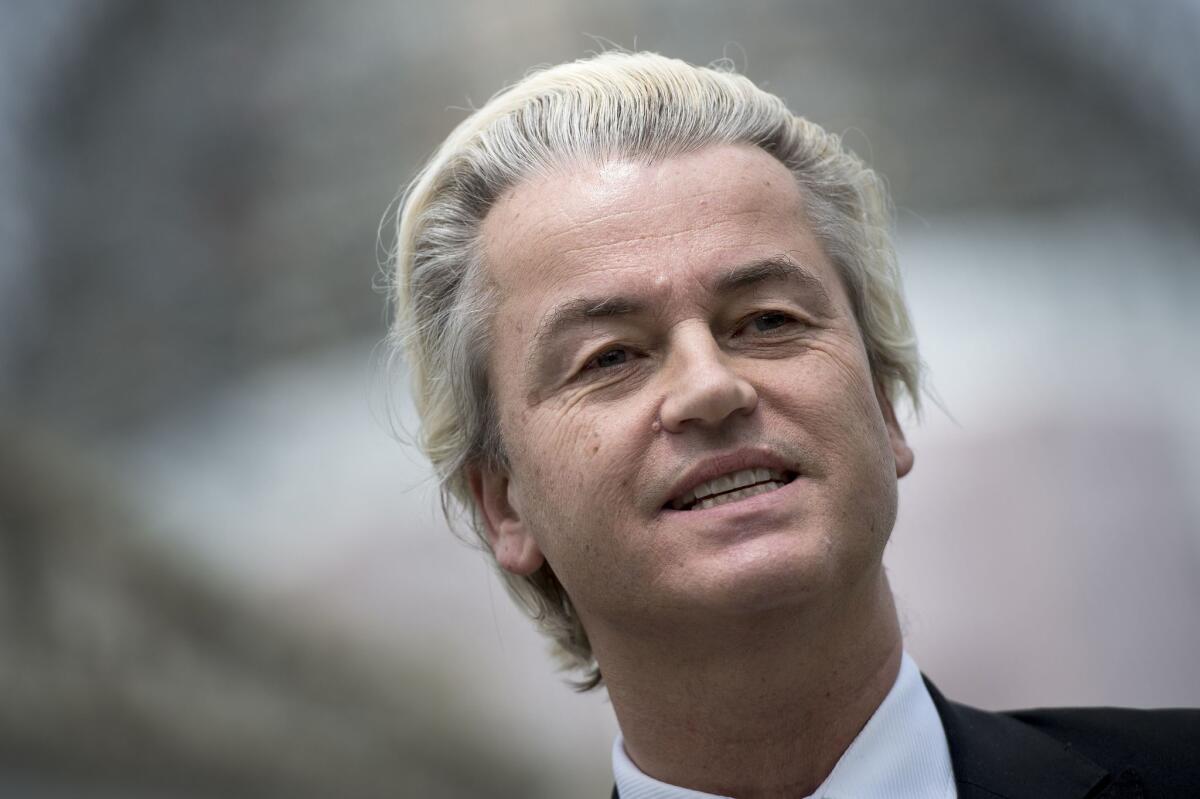
The leader of the Dutch far-right Freedom Party (PVV), Geert Wilders, is seen during a visit to Washington, D.C. in April. Wilders has advocated closing Dutch borders to stop what he has called an “Islamic invasion.”
Donald Trump is a puzzle to political analysts. He's commonly described as a creature of the far right, given his ultra-hard-line stances on Mexican and Muslim immigration. But polls commonly show that his strongest base of support is among moderate-to-liberal Republicans. Conservative pundits, moreover, complain that Trump has long been generous with donations and kind words for Hillary Clinton. His record of Republican heresies includes touting Canadian-style, single-payer healthcare, a 1999 proposal for a massive one-time “wealth tax,” support for the Clinton-era assault weapons ban, opposition to the Iraq war and blasting conservative proposals to reform Social Security. Add that together, and the term “RINO” seems mild.
True, Trump's naked appeals to nativist, anti-immigrant populism have parallels in American history, from Pat Buchanan in the 1990s to George Wallace in the 1960s and 1970s to Millard Fillmore's Know-Nothing Party in the 1850s. Republican coalitions, however, have long placed a priority on pro-business, pro-free-market economic conservatism, social-issue causes such as abortion and guns, and devotion to constitutional principles such as limited government and federalism. Trump has little interest in any of these things. He's cozy with big government, often using eminent domain to seize private homes for casino parking lots; he has totally ignored the Planned Parenthood undercover video controversy; and he has been griping about foreign trade since the 1980s (then it was Japan, now China).
What gives? If you want to understand Trump, look across the ocean. In an American context, Trump's politics are incoherent. In a European context, Trump would fit more comfortably.
Dan McLaughlin is a lawyer in New York and a contributing editor at RedState.com.
Cold comfort for debate losers: Electoral winners don't do so well in the longevity contest
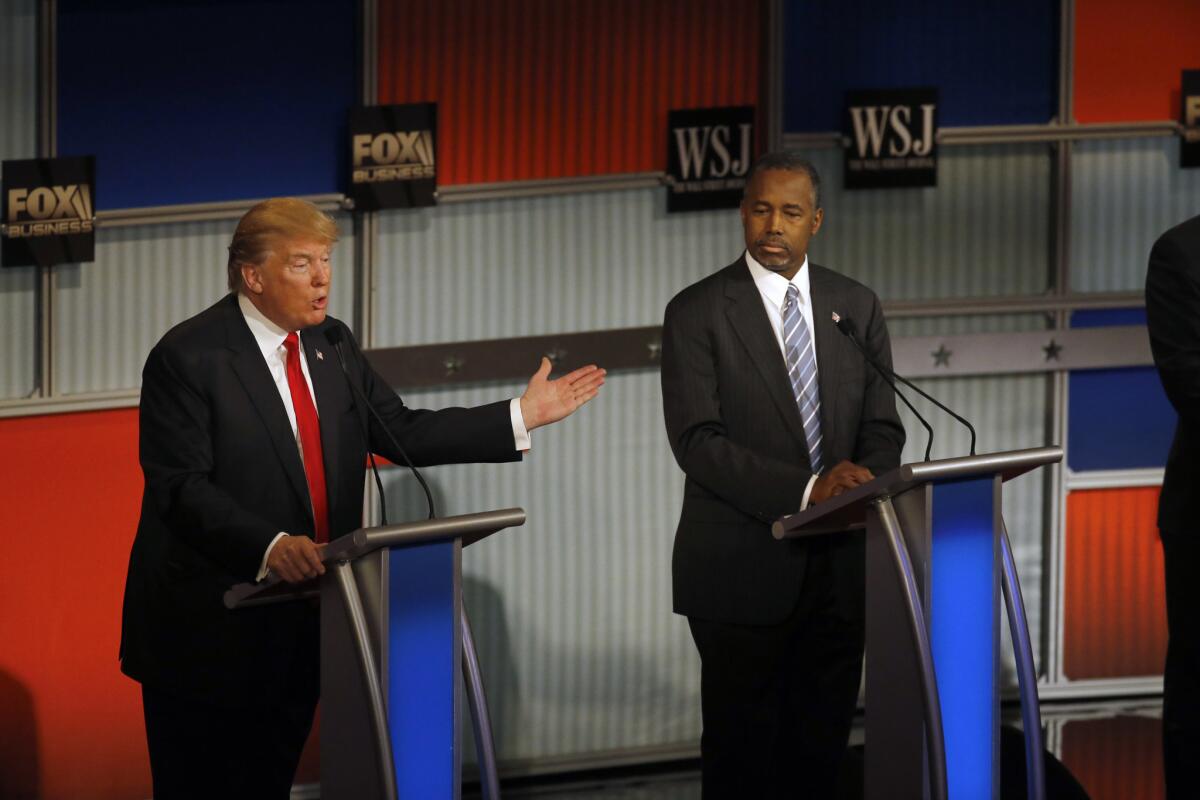
Donald Trump, Ben Carson and other presidential hopefuls might want to reconsider their campaigns in the wake of a study that says elected heads of state have lower life expectancies than the people who lose elections.
Ever notice how robust and chipper former Republican presidential nominees Mitt Romney and John McCain are compared with a graying President Obama these days?
If candidates for the highest political office in the land only knew the results of new research, they might be happier about losing an election. The findings might even whittle the outsized pool of Republicans vying for the job.
A study conducted with nearly three centuries of data (but also with tongue planted firmly in cheek) has found that after an election for parliamentary leadership or the presidency, losers lived four more years than did the winners who went on to serve as heads of state.
Five things to watch as Republicans take the Las Vegas debate stage
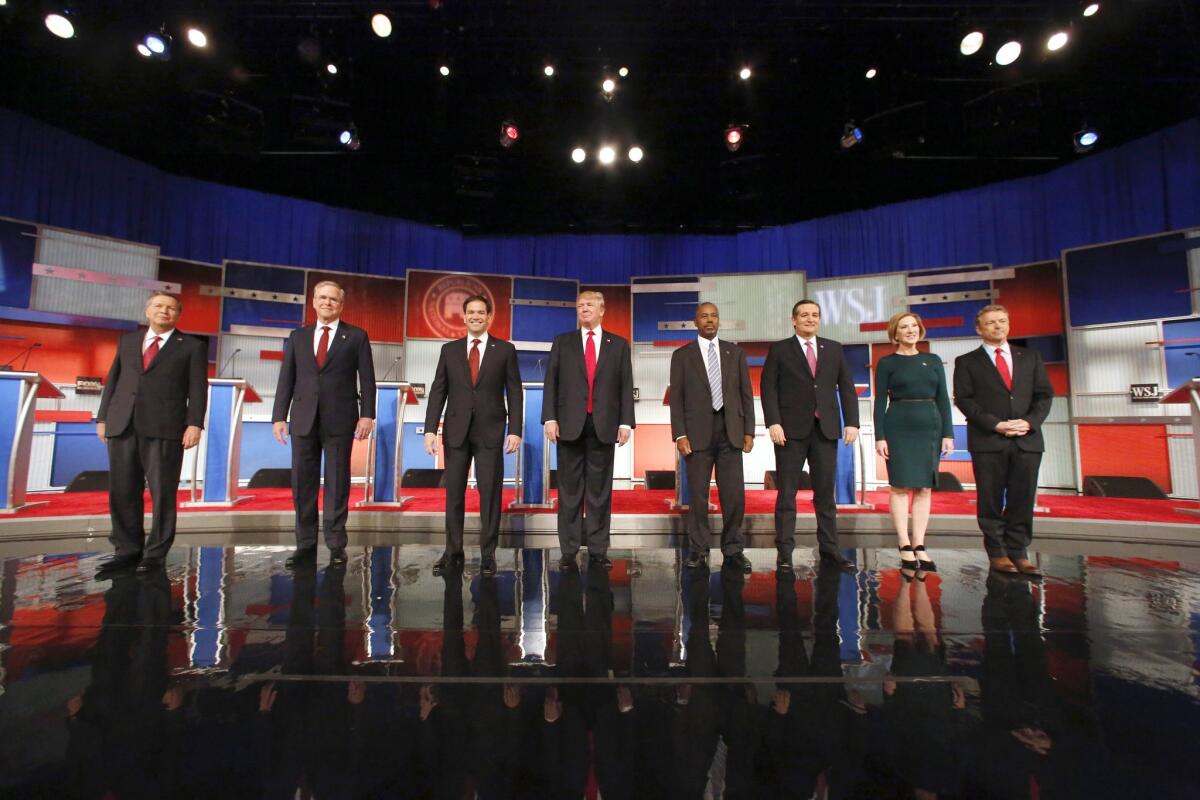
Republican presidential hopefuls, shown in November, return Tuesday night to the debate stage.
Nine Republican presidential hopefuls will gather Tuesday night on a stage in Las Vegas for their fifth and final debate of 2015. We hereby foreswear any Sin City allusions or obvious gambling metaphors.
No doubling down, no rolling of dice, no high-stakes confrontation, no jokers in the deck.
Instead, here are five things to watch for as the candidates face their last chance to pitch themselves to a national audience before the full force of the holiday season diverts all but the most obsessive political observers.
Two words: Palin's back; she likes Cruz, Trump
. @SarahPalinUSA plays a word association game with @jaketapper : https://t.co/qkfvp086jm https://t.co/mAmNmL69E4
— New Day (@NewDay) December 15, 2015
Which 2008 vice presidential candidate thinks some GOP candidates are robotic or controlled? Two words: Sarah Palin.
CNN played a game of word association with the former Republican governor of Alaska during a 25-minute interview Monday in Las Vegas. Palin shared her opinions of each candidate but refused to endorse any of them. She and her daughter Willow — who publicly backs businessman Donald Trump for the ticket — traveled to the city for the fifth GOP presidential debate, set for Tuesday.
CNN host Jake Tapper asked Palin to say the first words that came to mind when he listed the Democratic and Republican candidates -- and the current occupant of the Oval Office.
Florida Sen. Marco Rubio: “Robotic.”
New Jersey Gov. Chris Christie: “Embracing Obama.”
Democratic front-runner Hillary Clinton: “Nyquil.”
Former Florida Gov. Jeb Bush: “George.”
And President Obama: “Warned ya.”
Palin also accused the media of distorting Trump’s controversial proposal to ban travel to the United States by Muslims. She said she didn’t think he finished his thought on the topic and that she thinks Trump’s motive was to call attention to immigration.
At the end, though, she did sway toward supporting Trump by choosing him as a person she’d want to share a drink with. And she alluded to whom she may endorse in the future.
"I'm not going to pick one right now, but what a nice problem to have if it came down to Cruz and Trump," Palin said.
New Rubio ad targets Clinton
While Marco Rubio fights to overtake his Republican rivals for the party's presidential nomination, his supporters have another target in mind: Hillary Clinton.
In a new TV ad from Conservative Solutions, a super PAC supporting Rubio, the focus is on national security, and the narrator calls Rubio the candidate Clinton never hopes she runs against.
“We will have foreign policy of moral clarity — that is clear whose side we’re on,” Rubio says in the ad. “We are on the side of freedom and democracy and those who are willing to fight for their own freedom and democracy.”
A Monday poll released by the Wall Street Journal/NBC News showed Rubio — polling around third among Republicans — attracting more independent voters and beating Clinton 48-45% in a head-to-head matchup. Though such a hypothetical is not predictive of an election that is still 11 months away, Rubio did do better against Clinton than his GOP rivals.
Rubio presses national security in his campaign. He attacked rival Texas Sen. Ted Cruz this week for what he called an “isolationist” stance that falls short on national security. He said Cruz speaks about fighting terrorism but voted against the government's bulk collection of phone data, which Rubio viewed as a mistake.
Under the revision in the law that went into effect last week, the National Security Agency can no longer sweep up phone records of Americans who aren't suspected of terrorist ties.
“The world is a safer place when America is the strongest country on earth,” Rubio said in the ad.
The commercial started airing in Iowa and New Hampshire. Conservative Solutions will continue the ad campaign through early state voting.
Gun-control ad aimed at lawmakers to air in Washington during debate
Everytown for Gun Safety, a gun-control group, will air an ad during Tuesday night’s GOP debate urging lawmakers to stop allowing people on the terrorism watch list to buy guns.
“Suspected terrorists can walk into one of 50,000 gun stores and legally buy a gun, and then walk into our churches, our factories, anywhere, and fire away,” a voiceover says in the 30-second ad, which features images of children in school, a family in a movie theater and worshippers in a church.
The Senate blocked an effort to close the loophole on the day after the shooting rampage in San Bernardino that killed 14.
“When Congress fails to act, it endangers us all,” the voiceover says.
The ad, which is aimed at members of Congress, is airing during the CNN-sponsored debate in the Washington media market.
Hillary Clinton focuses on San Bernardino and terrorism
As the GOP presidential candidates prepare today for their first debate since the San Bernardino attacks, Hillary Clinton will be presenting her plan for protecting the nation against terrorism.
Campaign officials say a speech Clinton will give in Minneapolis will focus on the “urgency and complexity” of the threat in the aftermath of San Bernardino, and include a detailed strategy for countering “each step in the process that can lead to a terrorist attack like San Bernardino.”
The speech is intended to highlight the contrast between Clinton's approach to the problem and those of her GOP rivals, many of whom are calling for new restrictions on who should be allowed into the country. Clinton remains a staunch proponent of loosening some of the nation’s immigration restrictions and providing sanctuary to war refugees, regardless of their religion.
But she has also demanded that Silicon Valley step up its role in helping law enforcement find and monitor terrorists online, raising data privacy concerns among civil rights advocates and the technology industry.
Tonight's likely debate agenda: National security and Trump
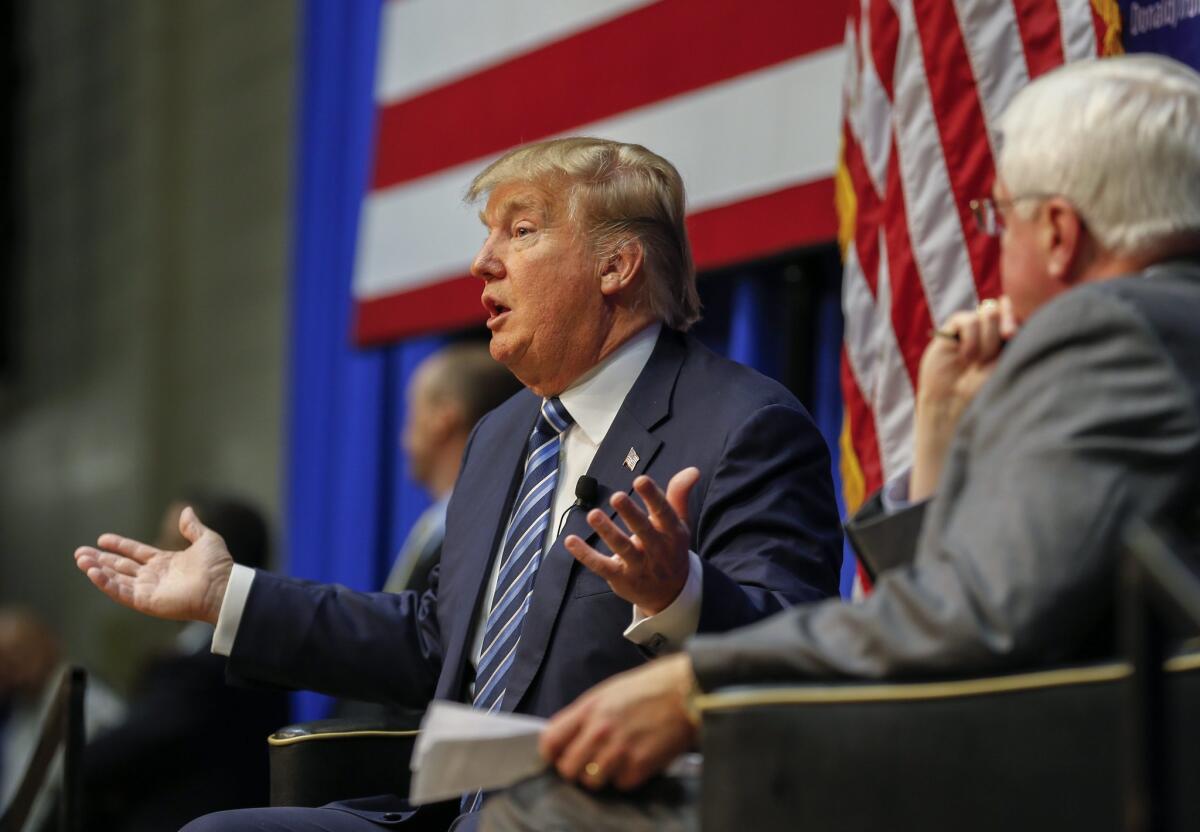
Republican presidential candidate Donald Trump participates in a campaign town hall event at Wofford College in Spartanburg, S.C. on Nov. 20.
The Republican presidential hopefuls will debate in Las Vegas on Tuesday amid a particularly volatile campaign stretch. Terrorism attacks at home and abroad have unleashed new anxieties among voters, and some candidates have surged anew in key early-voting states.
Yet for eight of the nine top-tier candidates on the prime-time stage, their top task is one that has vexed them for months: how to siphon support from the race’s front-runner, Donald Trump.
This gathering offers one last opportunity for the the full range of Trump-containment strategies, from the combative approach taken by Ohio Gov. John Kasich to Texas Sen. Ted Cruz’s determinedly conciliatory tone, to take hold before an anticipated lull in campaign activity over the holidays. And other simmering feuds, such as the rivalry between Cruz and Florida Sen. Marco Rubio, also lurk as potential subplots.
By the numbers
Get the L.A. Times Politics newsletter
Deeply reported insights into legislation, politics and policy from Sacramento, Washington and beyond. In your inbox twice per week.
You may occasionally receive promotional content from the Los Angeles Times.

